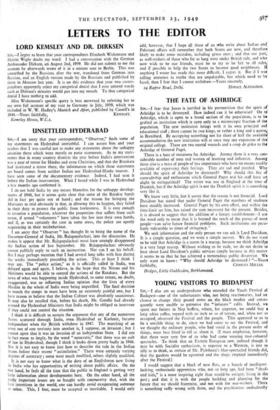THE FATE OF ASHRIDGE
SIR,—I fear that Janus is justified in his premonition that the spirit of Ashridge is to be destroyed. How indeed can it be otherwise? On tor Ashridge, which is open to a broad section of the population, is to be grafted an institution which is open only to a microscopic fraction of the population. The new institution brings with it its own principal and educational staff ; there cannot be two kings, or rather a king and a queen( in Brantford. By occupying something not far short of half the availabld accommodation the new institution will at once stop any expansion of that original college. There are two mortal wounds and a coup de grdce to *ha Ashridge of General Paget.
There is a host of mourners for Ashridge. Among them is a very con• siderable number of men and women of learning and influence. Among them also is a mass of people of less importance who have no means readily available of expressing their feelings. They are sad and puzzled. Why ' should the spirit of Ashridge be destroyed? Why should this fire of comradeship and enthusiasm which General Paget and his staff have se alight be extinguished? The writer was not in England at the time of Dunkirk, but if the Ashridge spirit is not the Dunkirk spirit it is something very like it.
We know very little, but it seems that the reason is not financial. Lord Davidson has stated that under General Paget the numbers of students have steadily increased. General Paget by his own effort, and within the time-limit set him, has raised the sum necessary for the present. Besides, it is absurd to suggest that the addition of a luxury establishment—I use the word only to mean that it is beyond the reach of the purses of most people—can solve future financial problems. Such institutions are pecu- liarly vulnerable to times of stringency."
We seek information and the only person we can ask is Lord Davidson. It is a simple question, and we want a simple answer. We do not want to be told that Ashridge is a storm in a teacup, because we think Ashridga is a very large teacup. Without wishing to be rude, we do not desire to hear about Lord Davidson's public services simply because in this matter it seems to us that he has achieved a tremendous public disservice. We only want to know: "Why should Ashridge be destroyed ? "—Yours' faithfully, CIIARLES MILLER. Hedges, Little Gaddesden, Berkhamsted.


































 Previous page
Previous page